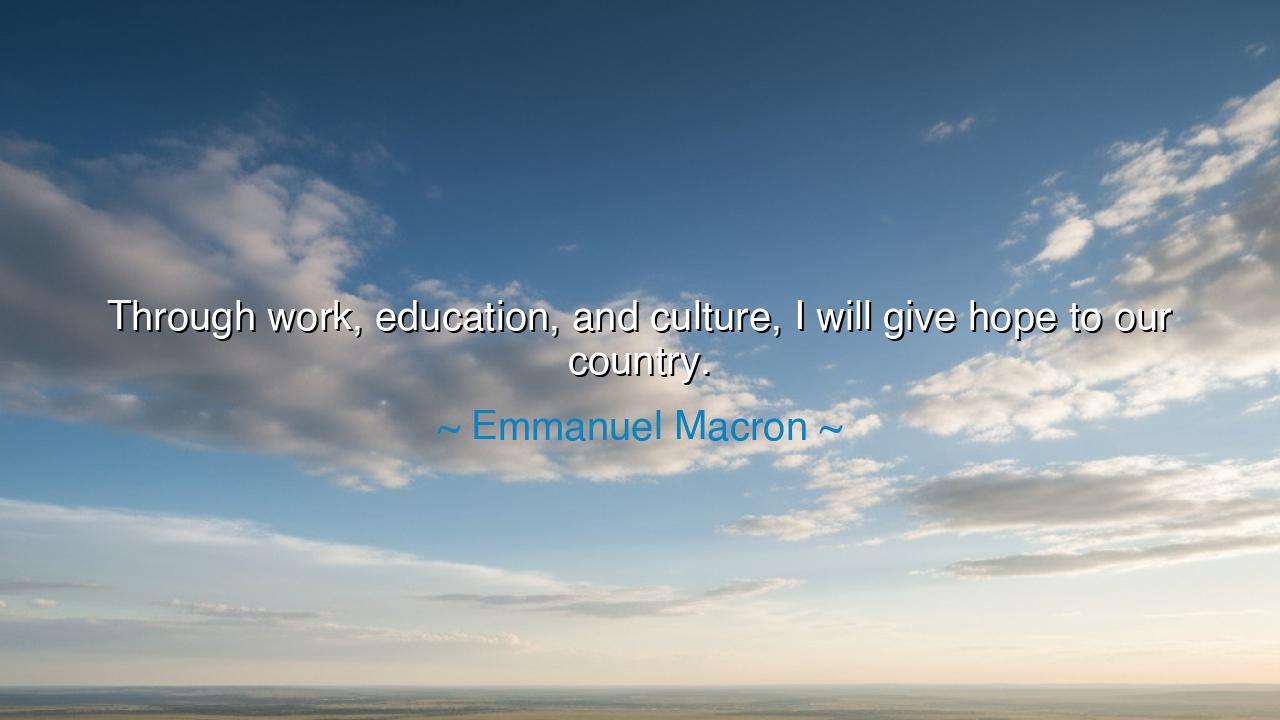
Through work, education, and culture, I will give hope to our






“Through work, education, and culture, I will give hope to our country.” — thus spoke Emmanuel Macron, leader of France and son of a long, unbroken lineage of thinkers who believed that the soul of a nation is not preserved by power alone, but by the enlightenment of its people. In these words he pledges not merely a policy, but a philosophy — one that echoes through the centuries from the wisdom of the ancients: that hope is not born of miracles or promises, but of labor, learning, and the shared light of culture. For a people’s strength does not lie in its weapons, nor in its wealth, but in its mind, its hands, and its heart.
When Macron declared these words, he was speaking to a nation long burdened by doubt — a France divided by change, by fear of the future, by the memory of its once-glorious past. Yet his call was not to nostalgia, but to renewal. He invoked work, education, and culture as the three pillars of rebirth, the sacred trinity of civilization itself. In work, he saw dignity — the effort through which each man and woman contributes to the whole. In education, he saw liberation — the awakening of the mind from ignorance and despair. And in culture, he saw communion — the thread that weaves individuals into a people, binding them through art, history, and shared values. These three forces, he believed, could once more kindle hope, that most fragile yet enduring flame of humanity.
The ancients, too, held to this triad of renewal. The philosopher Confucius taught that a nation is built upon three things: food, weapons, and trust — and that of these, trust, born of moral and cultural harmony, is the most essential. The Greeks spoke of paideia, the cultivation of the whole person — through learning, labor, and art — as the foundation of a virtuous society. In every age, civilizations have risen and fallen according to the balance of these forces. When people lose the dignity of work, the pursuit of knowledge, and the love of beauty, their hearts grow cold and their nations decay. Macron’s words, therefore, are not merely political — they are the echo of a timeless truth that even the most ancient sages would have understood.
Consider the story of post-war Europe, when, after the devastation of the Second World War, the continent lay in ruins. Cities were rubble, economies broken, faith in humanity nearly extinguished. Yet from that desolation arose the European Renaissance of the modern age, not by decree or conquest, but by work, education, and culture. Workers rebuilt the cities with their hands; scholars and teachers rebuilt the minds of the young; artists, writers, and musicians healed the spirit of the people through beauty and remembrance. It was through these acts — humble and profound — that hope returned. The vision Macron speaks of is born from that same understanding: that the destiny of a nation is written not in the stones of its monuments, but in the daily labor, learning, and art of its citizens.
There is, too, a deeper wisdom hidden within this statement — the recognition that hope must be built, not bestowed. A leader cannot give hope as a gift; he can only awaken it. Through work, he can call forth the pride of creation; through education, he can light the mind’s fire; through culture, he can remind the people of who they are and what they might yet become. For hope, once kindled, must live in the heart of every citizen. The nation becomes not merely a collection of individuals, but a living organism, moving with purpose toward a shared future.
Macron’s words also remind us that a people’s culture — their language, their music, their art — is not ornament, but identity. To nourish it is to nourish the soul of a civilization. The Romans once said, “Without culture, we are barbarians,” for they knew that even empire must rest upon the softer powers of intellect and imagination. To restore culture is to restore meaning; to restore education is to restore vision; to restore work is to restore purpose. In this way, hope becomes the natural fruit of harmony between the hands, the mind, and the spirit.
Therefore, O listener of tomorrow, take these words not as distant rhetoric, but as personal commandment: Labor well, learn deeply, and love beauty. In your work, find meaning; in your study, find truth; in your culture, find unity. For every nation, no matter how mighty, begins in the heart of one citizen who dares to hope — and hope, once awakened, can raise even the fallen world. As Emmanuel Macron reminds us, the path to renewal does not lie in power or wealth, but in the living triad of work, education, and culture — through which every people, in every age, may once again give hope to their country and light to the world.






AAdministratorAdministrator
Welcome, honored guests. Please leave a comment, we will respond soon